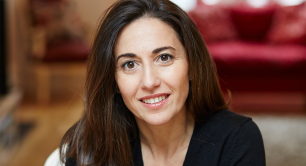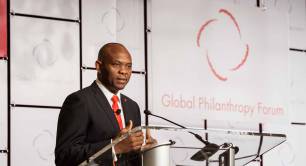The million dollar entrepreneur cleaning up asset management
Paul Robinson is on a mission – to challenge the financial status-quo of the global economy and to prove that it is possible to receive competitive returns through responsible investment.
He is one of the key speakers on Adessy Associates’ Pioneers for Change programme which aims to connect and galvanise leaders promoting positive social and environmental change.
Paul’s flair for entrepreneurship was evident from an early age. His career has involved a five-year stint working in the city for Standard Life, followed by a move to Hong Kong to work in private banking before setting up a fund management business, which in five years grew to $500m assets under management and $5m a year in revenue.
As his career progressed memories of travels through Africa remained vivid and eventually influenced a change in career path that would result in the launch of Alquity, which aims to transform the way people invest.
Pioneers Post: What made you decide to sell an extremely profitable fund management business to set up Alquity?
Paul Robinson: It’s been a bit of a journey. At the end of the five years I spent at Standard Life, I took a year off that soon became two years off and travelled. I spent an awful lot of that time in Africa and really fell in love with it as a place – the people, the geography. I also got exposure to emerging communities.
I love building businesses but I hadn’t forgotten about my time in Africa.
I remember very clearly stopping in Malawi with this group of children. We took a football out of the car and started playing a game. We played with them for about an hour but then it was time for us to go and the kids were really upset. It wasn’t because they were about to lose our silky football skills – certainly not mine – it was because they thought we were going to take the football. It hit me that a football was something so unattainable to them.
After five years developing my fund management business I wanted to do something different. I love building businesses but I hadn’t forgotten about my time in Africa.
Challenging the status-quo
Before launching Alquity, Paul spent time getting involved with African charities, but found the experience frustrating. Having worked in the fast-paced financial sector, the level of ambition and the slower speed at which things would get done was a shock.
Turning to his entrepreneurial roots, Paul then worked with friends to set up One Water – a bottled water company where 100% of the profits are donated to fund water projects in Africa. It is sold in Starbucks and is the only water sold in World Duty Free shops in UK airports. Over 10 years One Water raised more than £10m, giving clean drinking water to two million people.
PP: What did you learn through your involvement setting up One Water and how did this lead to the Alquity fund?
PR: It proved to me that by running a business in this way you can create more sustainable change. You don’t spend your time asking for money as you would with a traditional charity – you spend your time running the business.
I realised there was a fantastic investment opportunity in Africa. We could take this One Water business model into fund management, which is a highly profitable industry and one that is really broken in terms of its relationship with the end consumer – there’s very little trust. Could we build a model that gave people their returns in a better way, one that helped grow the economies they are investing in? That’s where Alquity really came from.
Investing in the ecosystem
PP: Can you explain further the key concept behind Alquity?
PR: Alquity is an investment business so first and foremost it is about delivering great returns for our clients but also recognising that this is best achieved by being placed positively within the ecosystem of society, rather than sitting parasitically on the side of it.
It makes no sense to invest in these emerging economies and then leave half the population economically inactive on the side.
Through our funds, such as the Africa fund and the Future World fund, we invest in fast growth emerging markets where we think we can get clients good returns. We look at all the businesses we invest in on an environmental, social and governance basis (ESG). As well as looking at all the numbers, we look at how they behave. Do they treat their workers correctly? Do they respect the environment? Not from an ethical standpoint but because if you do those things properly you get better returns in the long run.
We then donate up to 25% of our revenue to fund things like microfinance to help the poorest in the communities where we invest. I would argue that helping people who are poor just because of where they were born is a good end it itself, but actually if you help these people get their first foot on the economic ladder they start to make some economic progress and they actually have some money to spend.
If they’re in Africa, they’ll probably go and buy a mobile phone. That mobile phone will probably come from MTN – which is a holding in our fund – so you’re building the ecosystem that you’re investing into. It makes no sense to invest in these emerging economies and then leave half the population economically inactive on the side.
We’ve had to educate people that we’re not a charity. That they’re not going to get a lower return for this because of the model. The natural assumption seems to be if you’re doing something good I must be giving something up – that’s not how we work.
Taking on the financial heavyweights
PP: What have been the key challenges in launching Alquity?
PR: Asset management is not a very innovative sector – it’s dominated by the big players, the JP Morgans, the Fidelity’s. You don’t have a lot of smaller start-ups because of regulatory constraints and the costs involved. It as easy as starting up an innovative social enterprise in a lot of other spaces, you really can’t do that in this industry. You need to have the financial resources to scale and a certain track record. The industry and the regulators need to think about how to break that down because if you want innovation you need new entrants.
I am absolutely a free market capitalist, as long as it’s a meritocracy.
2013 was our breakthrough year – we delivered a 15.3% return from our Africa fund. In the same year JP Morgan did 5.1% from theirs and Investtec returns were negative. We beat all the competition and we did it with a lot less volatility. Because of our environmental and social governance, we avoided some of the worst performing stocks. At the same time, in that year alone, we transformed 7,500 lives. We won’t always do that but it was important to show people by choosing us they’re not giving something up.
Alquity is about fair opportunity – promoting a world where everybody has the opportunity to achieve by expressing their talents and ambitions. I am absolutely a free market capitalist, as long as it’s a meritocracy. In many markets this absolutely isn’t the case.
Passion and persistence
PP: What advice do you intend to share with the Pioneers for Change participants?
PR: Don’t assume that if the older people who have been in business for longer are doing something and it looks stupid that there must be a very good reason for it. There often isn’t – people just do silly thing because they do silly things.
Also, one of my favourite mantras in building business from an entrepreneurial point of view came from my parents – ‘no’ is only ever a station stop on the road to ‘yes’. As a child if I wanted to do something we found very quickly that if my parents said no at first, if you asked four, five, six times, eventually it becomes yes.
I have that also with my staff if they tell me somebody said 'no' and won’t do something, I tell them they just said 'not yet'. All we have to do is find a way to ask the question so that they say 'yes'.
Photo credit: CIAT



